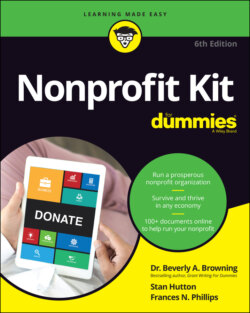Читать книгу Nonprofit Kit For Dummies - Stan Hutton, Beverly A. Browning - Страница 59
Primary role: Preserving public trust
ОглавлениеA board’s primary governance responsibility is fiduciary — to uphold the public trust. Laws in the United States give special rights and privileges to nonprofits recognized by the IRS as public charities. Primarily, these nonprofits earn the right to exemption from corporate income tax and the right to receive contributions that are tax-deductible for the donor. The government gives nonprofits this special status because they provide a public benefit. A board’s leadership and oversight keep the organization’s focus on that public benefit and make sure it doesn’t abuse these rights and privileges.
Suppose that a nonprofit begins with a mission to rescue horses that have been neglected or abused. People who support this idea make contributions to the nonprofit with the belief that their money is being spent on programs to help the plight of horses in need of intensive care. But unknown to the donors, the nonprofit begins to spend its money on programs to charter schools. Supporting charter schools is a worthy goal, but it’s a long way from the original purpose of helping neglected or abused horses. So, in this example, even though the nonprofit is using its contributions for a good cause, it isn’t using them as the donors intended or to fulfill the organization’s original purpose. Most importantly, the nonprofit is forgetting its mission, vision, and strategic plan. Either the founder or the governing board appears to have a case of amnesia for heading down an unapproved service road for quite a different target population.
A nonprofit that collected funds to help neglected and abused horses but instead used the funds for the personal benefit of the board members and staff would be even worse. This dishonest act is serious and possibly a crime. Aside from potential felony fraud charges, such an activity violates IRS rules and can result in the revocation of the nonprofit’s tax-exempt status.
In a for-profit business, the managers can share the net earnings (in other words, profit) at the end of the year among the company’s owners or stockholders. If nonprofit board members decide to divide surplus funds among themselves, it’s called inurement, a big word that basically means personal enrichment, which isn’t allowed in the nonprofit world. Board members and staff can’t personally benefit from nonprofit funds except for compensation for services provided or for reimbursement of expenses. A board must not only ensure that the nonprofit is doing what it set out to do but also make sure that it spends its funds properly. If a board does nothing else, it must make sure the organization adheres to these standards.
A board’s responsibilities are legal responsibilities. The three main duties that every board must uphold are care, loyalty, and obedience. Although they sound like vows one may take when entering a monastery, they actually describe established legal principles. Here’s what these duties entail:
The duty of care: Refers to the responsibility to act as a prudent board member. In other words, board members must pay attention to what’s going on and make decisions based on information that’s available with reasonable investigation.
The duty of loyalty: Means that a board member must put the organization’s welfare above other interests when making decisions.
The duty of obedience: Requires that board members act in accordance with the nonprofit’s mission, goals, and bylaws.
Basic information about board governance is available from BoardSource (www.boardsource.org) without charge. You can access more in-depth material by paying a membership fee.
